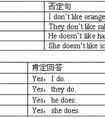用单词的适当形式填空。1.Bobis(Jenny)brother.2.Weoftengototheparkon (Sunday).3. (a) orangeplayercatchestheball.4.Bob'steam (play)basketballthis evening.5-六年级英语
"Can one boy do it?" "No, but two (boys) can." “一个小孩做得了吗?”“不行,要两个小孩才行。”
区别二:
当要强调数量概念或进行数量对比时,只能用数词 one。如:
"How many pens do you have?" "I have one (pen)." “你有几支钢笔?”“我有一支钢笔。”
I want one apple, not three apples. 我要一个苹果,不是三个苹果。
区别三:
若不是表示“一”的数量概念,而是表示“类别”概念,则只能用不定冠词。如:
A computer is useful. 电脑是有用的。
He is an excellent teacher. 他是位优秀的教师。
区别四:
在某些短语中,两者均可用,含义相同。如:
at a [one] blow 一下子,一举
in a [one] word 一句话,总而言之
而在某些表达中,两者均可用,但含义不同。如:
at a time 每次,同时
at one time 一度,曾经
还有一些表达,两者均可用,虽含义相同,但表达不同。如:
on a hot summer afternoon 一个炎热的夏日的下午 (用介词 on)
one hot summer afternoon 一个炎热的夏日的下午 (不用介词 on)
an hour and a half 一个半小时 (不说 one hour and a half)
one and a half hours 一个半小时
a minute or two 一两分钟 (不说 one minute or two)
one or two minutes 一两分种
注意,在绝大多数习语中,两者是不能换用的。如:as a result 结果,all of a sudden 突然,one day 一天,one by one 一个一个地,等等。
区别五:
与表示时间或度量衡的名词连用表示“每”时,只用不定冠词。如:
Brush your teeth twice a day at least. 每天至少要刷牙两次。
They are sold at two dollars a dozen. 他们的售价是每打两美元。
考点名称:副词
- 副词:
用来修饰动词、形容词、其他副词或全句的词,表示时间、地点、程度、方式等。 - 分 类:
1) 时间和频度副词:
now,then,often,always,usually,early,today, lately, next,last,already,generally,frequently, seldom,ever,never,yet,soon,too, immediately, hardly,finally,shortly, before, ago,sometimes, yesterday.
2) 地点副词:
here, there, everywhere, anywhere, in, out, inside, outside, above, below, down, back, forward, home, upstairs, downstairs, across, along, round , around, near, off, past, up, away, on.
3) 方式副词:
carefully, properly, anxiously, suddenly, normally, fast, well, calmly, politely, proudly, softly, warmly
4) 程度副词:
much,little, very,rather,so,too,still, quite, perfectly, enough, extremely, entirely,almost, slightly.
5) 疑问副词:
how, when, where, why.
6) 关系副词:
when, where, why.
7) 连接副词:
how, when, where, why, whether. 副词的位置:
A、副词修饰动词(包括动名词和分词)时,通常位于被修饰动词的后面。
例:Shestudieshard.她学习努力。
B、副词修饰形容词是,通常放在该形容词的前面。
例:LiMingistooyoung.Hecan’tcarrytheheavybox. 李明太小,他搬不动这个重箱子。
C、副词修饰其他副词时,通常放在被修饰副词的前面。
例:Thegirlsingsverywell.这个女孩歌唱得非常好。副词用法:
副词在句中可作状语,表语,补语。
He works hard.
他工作努力。
You speak English quite well.
你英语讲的很好。
Is she in ?
她在家吗?
Let's be out.
让我们出去吧。
Food here is hard to get.
这儿很难弄到食物。
考点名称:一般将来时
一般将来时:
表示将来某个时间要发生的动作或存在的状态,也表示将来经常或反复发生的动作。
由“助动词will+动词原形”构成。“be going to+动词原形”结构是将来时的另一种形式,表示将要发生的事或者事先经过考虑打算去做某事。
例:We will go to Shanghai next year. 明年我们要去上海。
We are going to have a football match tomorrow. 我们明天要举行一场足球比赛。
Tom is going to have a bath. 汤姆要去洗澡了。一般将来时常见结构:
1、will / shall + 动词原形(否定句在will/shall后加not)
will 常简略为 'll,并与主语连写在一起,如: I'll,she'll,he'll,it'll,we'll,you'll,they'll。
一般疑问句如用will you…?其简略答语须是Yes,I will或 No,I won't;如用 Shall I…?(较少见)其简略答语须是 Yes,I shall.或 No, I shall not.
这种方法一般单纯地表示将来某个时间将要发生的动作或存在的状态。will用于各种人称;shall只用于第一人称。 例如 :
I will / shall go to visit him next week. 下周我将去拜访他。
What time shall we go there tomorrow? 明天我们几点去那儿?
2、be going to 动词原形
be going to 相当于一个助动词(其中be有人称和数的变化),与它后面的动词原形一起构成谓语。用来表示近期将要发生的动作以及计划、安排和打算要做的事。例如:
There is going to be a football match this afternoon.今天下午将有一场足球赛。
I‘m going to go to the park. 我将要去公园。
常用结构:
1、用于"I expect, I'm sure, I think, I wonder宾语从句"中。
Don't worry about the exam. I'm sure you'll pass.
不要担心这次考试,我确信你会通过的。
2、用于祈使句和陈述句中。
Work hard and you will succeed.
如果你努力,就会成功的。
3、与表示时间或条件的状语从句连用。
I'll let you know as soon as he arrives.
他一到我就通知你。- be going to与will的区别:
be going to与will两者都可表示将要发生的事、将要去做某事,但它们有如下几点区别:
1. be going to 表示近期、将要发生的事情,will 表示的将来的时间则较远一些,如:
He is going to write a letter tonight.
He will write a book one day.
2. be going to 表示根据主观判断将来肯定发生的事情,will表示客观上将来势必发生的事情。
He is seriously ill. He is going to die.
He will be twenty years old.
3. be going to 含有“计划,准备”的意思,而 will 则没有这个意思,如:
She is going to lend us her book.
He will be here in half an hour.
4.在有条件从句的主句中,一般不用 be going to, 而多用will, 如:
If any beasts comes at you, I'll stay with you and help you
注意
be going to和will在含义和用法上稍有不同。be going to往往表示事先经过考虑的打算;will多表示意愿,决心。两者有时不能互换。如:
She is studying hard and is going to try for the exams.她正努力学习并尝试参加考试。(is going to不能用will替换) - 一般将来时一般用法:
(1)一般将来时表示将要发生的动作或情况。
例如:I will(shall) arrive tomorrow.我明天到。(主语是第一人称时最好用shall)
Will you be free tonight? 你今晚有空吗?
We won’t (shan’t) be busy this evening. 我们今晚不忙。
(2)在一般将来时的句子中,有时有表示将来时间的状语,有时没有时间状语,这时要从意思上判断是否指未来的动作或情况。例如:
Will she come? 她(会)来吗?
(3)在以第一人称I或we作主语的问句中,一般使用助动词shall,这时或是征求对方的意见,或是询问一个情况(b):
a. Where shall we meet? 我们在哪儿碰头?
b. Shall we have any classes tomorrow?明天我们有课吗?
在这类问句中,近几年来也有不少人用will,特别是在美国。例如:
How will I get there? 我怎么去?
(4)be going to+ 动词原形
a.表示计划、打算、准备做的事。例如:
We are going to put up a building here.我们打算在这里盖一座楼。
How are you going to spend your holidays?假期你准备怎样过?
b.表示即将发生或肯定要发生的事。例如:
I think it is going to snow. 我看要下雪了。 - 常用时间状语:
1)tomorrow,the day after tomorrow,tomorrow morning/afternoon/evening
2)next year/week/month/hour/day/century
3)in+一段时间
4)in the future
5)this afternoon/Sunday/evening
6)from now on
7)one day,someday (未来的)某天
8)soon
- 最新内容
- 相关内容
- 网友推荐
- 图文推荐
| [家长教育] 孩子为什么会和父母感情疏离? (2019-07-14) |
| [教师分享] 给远方姐姐的一封信 (2018-11-07) |
| [教师分享] 伸缩门 (2018-11-07) |
| [教师分享] 回家乡 (2018-11-07) |
| [教师分享] 是风味也是人间 (2018-11-07) |
| [教师分享] 一句格言的启示 (2018-11-07) |
| [教师分享] 无规矩不成方圆 (2018-11-07) |
| [教师分享] 第十届全国教育名家论坛有感(二) (2018-11-07) |
| [教师分享] 贪玩的小狗 (2018-11-07) |
| [教师分享] 未命名文章 (2018-11-07) |

![Lynn is _____________brother.[ ]A. JennyB. Jenny's-五年级英语](http://www.00-edu.com/d/file/ks/4/1/11/2019-08-13/small12d37e5a1d2226fc304d6e745dfe4f4e1565627308.jpg)

![_________________ is too much for the girl to carry. [ ]A. The bag weightB. The bag of weightC. The weight of the bagD. The bag's weight-六年级英语](http://www.00-edu.com/d/file/ks/4/1/11/2019-08-13/small7cac983c1ee3ecd33fa8cc11cb7d3e421565627333.jpg)
![sister is a lovely girl. [ ]A. Wu Yifan B. Wu Yifan's C. He-六年级英语](http://www.00-edu.com/d/file/ks/4/1/11/2019-08-13/small05038944e626248e7b192354b979e9951565627320.jpg)
![___________ favourite shape is a circle. [ ]A. Danny B. Danny's-五年级英语](http://www.00-edu.com/d/file/ks/4/1/11/2019-08-13/small0b3c59e3cb12d3c407452caf300faa011565627303.jpg)
